In this 2nd part of the two-part article, you will find interesting information about quartz watches with their electric movement and their typical advantages and disadvantages:
Advantages and disadvantages of watches with quartz movement
Watches with quartz movements are much easier to produce than mechanical watches. Accordingly, a lower value is attributed to them. However, here you should differentiate. There are indeed plenty of cheap and inferior quartz watches. On the other hand, there are also very high-quality representatives of this genre, which are not really inferior to their mechanical counterparts in terms of quality. Here, too, there are considerable differences between the various movements, although the price level is usually well below that of good mechanical watches.
In principle, the quartz movement is the more advanced version of the watch drive, and for quite a while it looked as if they would completely displace the classic mechanical movements.
But it didn't come to that. In the meantime, both systems coexist and also serve completely different target groups and areas of application.
Here are the main advantages and disadvantages of the quartz movement:
Advantage 1: Quartz watches are uncomplicated and easy to maintain. With a fresh battery, a quartz watch is powered for one to two years (depending on the movement type, even up to 5 years). During this time, it usually runs completely maintenance-free and reliably. Longer breaks in use leave it unimpressed. It simply continues to run until the battery is depleted.
Advantage 2: Wristwatches with quartz movement run very accurately. This is where they exploit the advantage of their timekeeping principle. An oscillating quartz, which also gives the movement its name, ensures with its highly accurate oscillations that time deviations remain within the range of a few seconds per month. Thus, with this principle, the time does not have to be constantly readjusted (except for winter time, summer time or date change).
Advantage 3: Quartz watches are robust. There are few moving parts in the movement, and they are all much less sensitive than those in the highly delicate mechanical movement. This makes electric movements, which include quartz movements, more resistant to mechanical influences. However, they are naturally more sensitive to strong electrical or electromagnetic fields.
Of course, quartz watches also have disadvantages (or special features).
Here are a few examples:
Disadvantage 1: Quartz models need to have their batteries changed about every 2-5 years. This involves a certain amount of handling and also costs some money. However, when the batteries are changed professionally, critical seals are also changed at the same time and the water resistance is checked. This ensures a long-term problem-free running of the watch for another 2 to 5 years without maintenance. What remains is a small environmental impact from the button cell, which must be disposed of.
Disadvantage 2: The second hand of a quartz watch jumps only once per second and, for technical reasons, does not always exactly hit the scale lines. This is due to the drive principle and the fact that here the second hand is not constantly under spring tension. On a mechanical watch, on the other hand, the second hand typically takes 5 small steps per second and is held exactly in position by the tension in the gear train.
There are not significantly more advantages or disadvantages to quartz watches to mention.
They are clearly the more unassuming, uncomplicated and pragmatic movements.
In the end, it is a question of personal taste, demands and intended use whether someone tends to prefer an automatic watch, a hand-wound watch or a quartz watch. In any case, it is worth paying attention to quality.
And, of course, on the function and character that the particular watch embodies.
In the first part of the article "Mechanical watch vs. quartz watch - Part 1: Watches with mechanical movement" you will find interesting information about automatic and other mechanical watches along with their advantages and disadvantages.
Experience time in a new way!
Your Klaus Botta
Learn more about watch technology:
What is sapphire glass, and what does a high-quality anti-reflective coating do?


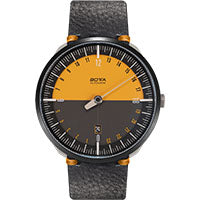
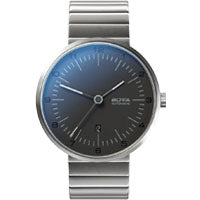
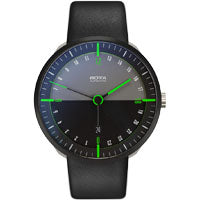
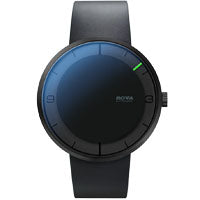
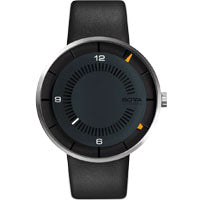
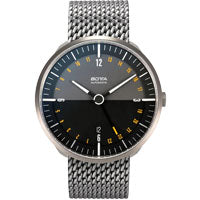
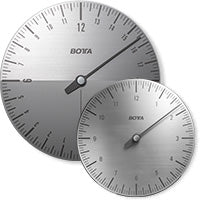


3 comments
Man kann einfach zusammenfassen: Wenn es darum geht, die Zeit jederzeit zuverlässig am Handgelenk ablesen zu können, ist eine Quarzuhr unschlagbar und bei gleichem Preis die bessere Uhr.
Sucht man eine Wertanlage oder ein Statussymbol, ist eine mechanische Uhr im Vorteil.
Ästhetisch spielt der Antrieb eine untergeordnete bis keine Rolle.
Umweltschutz (Batterie) sind i.d.R vorgeschoben, denn wenn wir es als Problem ansehen, alle zwei Jahre eine Knopfzelle auszutauschen, müssten wir sehr vieles in unserem Leben ändern.
Ein wesentlicher Vorteil der mechanischen (Automatik-) Uhren gegenüber den elektrischen Quarzuhren ist: Mechanische Uhren brauchen keine Batterie. Damit sind sie erheblich zuverlässiger als Batterieuhren. Auch wenn eine mechanische Uhr einmal stehenbleiben sollte, kann sie überall leicht wieder aufgezogen werden und zeigt dann die Zeit wieder verläßlich an. Ist die Uhrenbatterie leer, muß eine neue Batterie besorgt und eingebaut werden, was zum Beispiel auf Reisen oftmals gar nicht möglich ist.
Batterien belasten darüber hinaus den Geldbeutel und die Umwelt. Wenn es irgendwie geht, sollte man daher auf batteriebetriebene Uhren verzichten und sich für eine richtige Uhr entscheiden.
Gute Darstellung.
Frage: Können elektrische Uhren nach mehrjährigem Liegen mit leerer Batterie evtl. durch undichte Batterien beschädigt werden ?